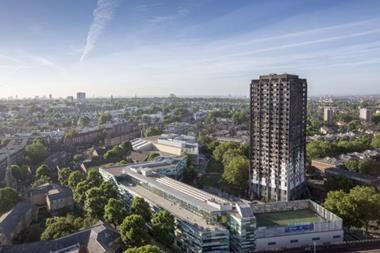Carillion’s recent collapse demonstrates that ‘business as usual’ is now a critical business risk.

That statement is not just aimed at tier-one main contractors, but also at consultants and commissioning clients. This could be the biggest example ofhow ‘modernise or die’ could play out on the ‘die’ side– and I don’t think it will be the last.
The Grenfell Tower tragedy has brought the issues of lowest-price procurement and indiscriminate use of ‘design and build’ contracts into question. This should highlight the way clients and their advisers engage with the construction market from the outset. As is often said, ask for the same thing and you’ll get the same outcome. This is why I highlighted the client’s role in my 2016 industry review and put some onus back on clients and advisers to help shape a better industry for all.
Reactions to the report have ranged from indifference to a gradual transformation in how things are done. The housing sector provides the most tangible evidence of new models using digital manufacturing and advanced construction methodologies. The most successful will be those that choose fully vertically integrated platforms, combining being a land-led developer, designer, manufacturer, constructor, sales and leasing outlet and, in some cases, asset manager.

This model operates with minimal use of consultants and contractors, limiting concern about industry fragmentation, multiple transactions, design and build contracts and the like.
However, most developers or investors will not want to vertically integrate production. They will be land- and planning-led, seeing the production process as a necessary evil to create assets to trade or become revenue streams. Using consultants and contractors seems like the easy route, however difficult and unpredictable the process.
As we enter a period of construction industry volatility, suppliers might revert to loss-leader bids to maintain cashflow as order books decline. This seems attractive to clients and quantity surveyors under budget pressure, but it is likely to end in tears. The route to driving construction costs down is not to go bargain hunting in a distressed construction sector, but to try and emulate the vertically integrated model.
Industry transformation
The secret to transforming our industry will be strong client leadership; consultants and tier-one contractors who do not try to block progress due to perceived vested interests; integrated composite teams; and technology-led, quasi-manufacturing delivery. This may not seem relevant to much of our industry, but more progressive businesses will have the ability to lead change. Successful use of the vertically integrated model requires many parties with the right mindsets to come together in a fundamentally different way, linked by project- or programme-based contractual alliances that can form virtual enterprises comprising many companies.
An emerging model in the UK is ‘insurance-backed alliancing’. The idea of multi-party contracting, aligned interests, non-hierarchical teams, efficient digital design and cutting transaction costs, by having project bank accounts and insurance that allows senior debt finance to be arranged, is a real game changer. Insurance-led technical assurance on a par with manufacturing sector quality planning protocols will provide the rigour our industry so desperately needs.

Design and build contracts continue to be executed on incomplete information and inappropriate risk transfer, often driven by banking term sheets, but also by advisers’ and clients’ sheer laziness. The Grenfell Inquiry, the Building Regulations Review, changes in central government infrastructure procurement and further industry failures, driven by the skills crisis, will create a new landscape for taking responsibility that will force change – from client, to procurer, to installer.
If you are irresponsible in organising or executing projects, there will be consequences, from losing money, to brand and reputational damage or even going bust. And as the findings of the Grenfell Inquiry are likely to show, the consequences will be profound for individuals, as well as businesses.
As we enter a dangerous phase for property and construction, where it will be highly tempting to carry on as before, it is time for clients and advisers to recalibrate. It’s time for contractors and specialists who look to buy work below cost to think again. Perhaps we should all think again, improve collective profit margins and end up with cheaper construction prices.
The real enemy is not the parties arguing over money and performance, but the industry’s waste and inefficiency, which need to be attacked through a different approach. We need to weed out the poor behaviour in all parts of our industry that perpetuates so many of our problems. That will take time, as unfortunately, collaboration and trust are still dirty words to many people in our sector. A new way of thinking will expose the individuals and businesses that are not part of our future.

































No comments yet